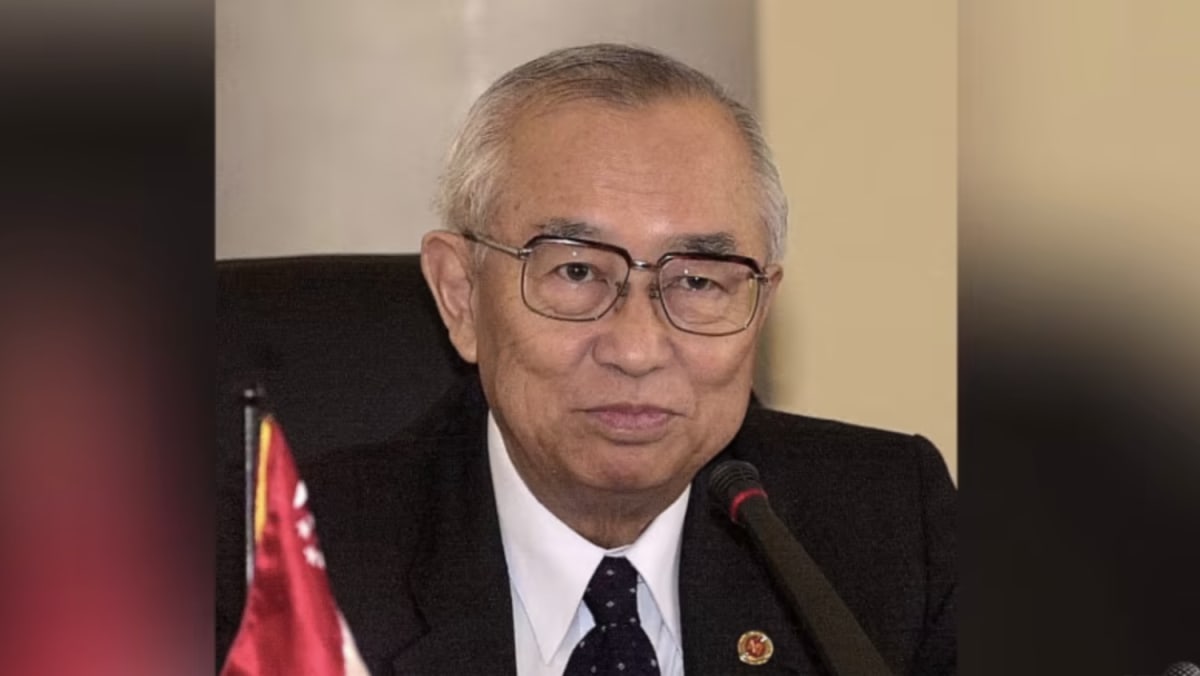
SINGAPORE — Dr Richard Hu, who served as Singapore’s Finance Minister for 16 years, died on Friday (Sept 8). He was 96.
Dr Hu first entered politics in 1984 after contesting in the General Election as a member of the People’s Action Party for the Kreta Ayer constituency, where he was elected as a Member of Parliament (MP).
Thereafter, he became the first MP to be appointed to the Cabinet after his election win and was named Minister for Trade and Industry.
In 1985, Dr Hu concurrently became the Health Minister, a role which he held until 1987, and the Finance Minister — a portfolio he held for 16 years until 2001.
Deputy Prime Minister Lawrence Wong, in a post on Facebook, paid tribute to Singapore’s longest-serving Finance Minister.
“He stewarded our finances well, and provided a steady hand to steer our economy through the 1997 Asian Financial Crisis,” Mr Wong said.
Acknowledging Dr Hu’s stints at the Monetary Authority of Singapore (MAS) and the Government Investment Corporation (GIC), Mr Wong added he “provided exceptional service to the two organisations, always fulfilling his duties with professionalism and grace”.
Mr Wong also recalled joining the Ministry of Finance in 1999, when Dr Hu was heading it, and how he made sure policies led to “tangible improvements in peoples’ lives”.
“I remember working on a Budget where he asked us to get information on the prices of some key essential items at the wet market, so as to get a better feel of the cost of living pressures that people were experiencing then,” Mr Wong said.
“That’s what I remember of Dr Hu — not just thinking about policies in abstract … In his quiet and humble way, he has served Singaporeans with distinction, and made Singapore a better place for us all!”
In a Facebook post, the Ministry of Finance said Dr Hu would “always have a special place in the hearts of former and current MOFers”, before expressing its deepest condolences to his family.
“We will remember Dr Hu for his many valuable contributions … Dr Hu presented 16 Budgets, and played key roles in steering Singapore through the Asian financial crisis (1997 to 1998) and reforming Singapore’s financial and banking sectors to support Singapore’s development as a financial centre.”
Dr Hu became MAS chairman in 1985, a position which he held until 1997, and also served briefly as the Minister for National Development from 1992 to 1993.
During his term, he introduced the Goods and Services Tax (GST) to reduce the government’s reliance on direct taxation as a revenue source and to broaden the tax base.
Deputy Prime Minister and Coordinating Minister for Economic Policies Heng Swee Keat lauded Dr Hu’s “wisdom and foresight”, saying on Facebook that GST “created a more resilient tax base for Singapore and boosted our international competitiveness”.
Mr Heng also recalled his time as a young civil servant and how he was inspired by Dr Hu’s “unwavering sense of public service”.
“Dr Hu played an instrumental role in transforming Singapore into a leading financial hub through an overhaul of our financial and banking sectors,” he said, adding that his contributions to Singapore will leave a “lasting imprint”.
In a statement on Friday, MAS paid its respects to Dr Hu: “The management and staff of MAS are saddened to learn of the passing of Dr Richard Hu, MAS’ third and longest-serving Chairman.”
It added that many of the older staff in MAS fondly remember Dr Hu for his “wise and steady leadership”.
“Dr Hu helmed the MAS during a period of rapid economic growth and financial sector development,” said MAS, adding that he upheld a strong commitment to sound monetary policy and prudent currency management.
“This conviction underpinned price stability and confidence in the Singapore Dollar during much of the 1980s and 1990s.”
MAS also said Dr Hu’s firm beliefs that high prudential standards and close financial supervision, areas that Singapore is known for, were critical for the long-term competitiveness and growth of Singapore’s financial sector.
Dr Hu also led the privatisation of then government-run Post Office Savings Bank (POSB), selling it to DBS in 1998.
Before his entry into politics, Dr Hu became Shell Singapore’s chairman and chief executive in 1977 and served on the board of the MAS from 1970, before becoming the managing director of Singapore’s central bank in 1983.
He was also appointed GIC’s managing director the same year he became MAS chief.
Dr Hu retired from politics in 2001, but continued to serve on the board of GIC and was the chairman of GIC Real Estate until June 2009.
He remained an advisor to the GIC Group executive committee until 2012 and was appointed the senior adviser to the board of Fraser & Neave the following year.
From 2004 to 2012, Dr Hu was also the chairman and independent non-executive director of the CapitaLand board and served as chancellor of the Singapore Management University from 2002 to 2010. CNA
For more reports like this, visit cna.asia.